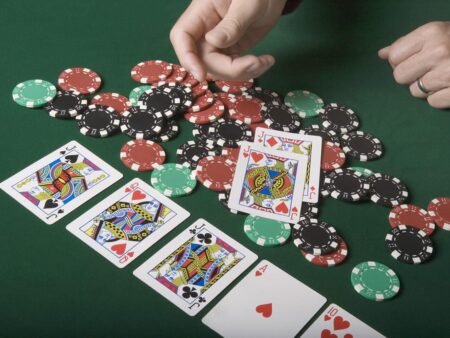
Whether you’re a casual player or a seasoned poker professional, understanding the intricate balance between skill and chance in online poker is crucial. This balance is not only essential to your strategy but also to the legal view of poker as a game of luck versus a game of skill. Let’s embark on this journey to dissect the role that chance plays in your gaming experience and the long-term implications of skill in your poker success.
Understanding the Role of Chance in Online Poker
Here is what you should know:
Luck is a short-term factor: In any single game or hand, the cards you’re dealt are a matter of luck. You can’t control which cards come your way, but you certainly can dictate how you play them.
Chance as an equalizer: Initially, all players, regardless of their skill level, are subject to the whims of chance. This means that in the short term, anyone can win, which keeps the game exciting and accessible.
Reducing the impact of chance through skill: As you play more hands, the influence of luck diminishes. Strategies, understanding of odds, reading opponents, and playing the long game become more influential.
Training and experience count: The more time you invest in learning the intricacies of the game and understanding the probabilities, the better you can maneuver around the hurdles that chance throws at you.
Remember, the beauty of online poker lies in the unpredictable dance between chance and skill. By recognizing the role of chance, you can stay optimistic and resilient, treating losses as learning experiences rather than setbacks.
Skill vs. Chance in Poker Legislation and Perception
Here is what you should know:
Legal implications: The classification of poker as a game of skill or chance carries significant legal implications, affecting the legality and regulation of the game in various jurisdictions.
Evolving viewpoints: Traditionally, poker has been seen as a gambling activity. However, as understanding of the game deepens, there’s a growing appreciation for the skill elements involved.
Intensity and duration: The argument that skill prevails over chance gains strength with increased play. Long-term players demonstrate consistent performance, suggesting that skill is a dominating factor.
Case for skill in the long run: Statistics show that the effect of chance indeed cancels out over an extended period, elevating the role of skill in your long-term success.
The shift towards recognizing poker as a game of skill is optimistic, empowering players like you to take control of your play and make strategic decisions that overshadow the randomness of the deal. Keep in mind that with persistence and commitment, your performance in online poker can transcend the bounds of chance, paving the way for a rewarding poker career.
The Importance of Skill in Long-term Poker Success
Imagine sitting down at a poker table, your heart racing with the thrill of the game. The cards are dealt, and as you peek at your hand, you understand that while luck might dictate this round, your skill is what will determine your success over time. It’s crucial to recognize that in poker, as in many areas of life, the balance between skill and chance is a dynamic interplay, where over the short term, chance may seem to hold sway, but over the long haul, it’s the skill that stands out. Here’s how:
Skill Enhancement: By consistently practicing and refining your strategies, you’re able to learn from each game, regardless of its outcome. This gradual accumulation of knowledge and experience is what edges out the randomness of the cards in the long term.
Strategic Decision Making: Each hand offers a new opportunity to make decisions based on the odds, your perception of the other players, and your position at the table. Your ability to make these informed decisions consistently will, over time, lead to better results.
Emotional Resilience: Poker is not just about playing the cards but also playing the opponents. Over time, developing emotional control can help you make better decisions, reducing the impact of bad beats or lucky breaks.
Learning from the Best: Observing skilled players and analyzing their games can provide you with insights that can dramatically improve your gameplay.
The Impact of Duration and Intensity on Poker Outcomes
Now, let’s delve deeper into how duration and intensity affect your growth and success in the game:
Longevity in the Game: The more hands you play, the more the element of chance is diluted, allowing your true skill level to surface. This is why seasoned players, with thousands of hands under their belts, are more likely to succeed over time.
Intensity of Play: Engaging in intense, focused game sessions can significantly improve your understanding of game dynamics. Each session becomes a learning experience.
Playing at Different Stakes: As you traverse various stakes levels, your skill is honed against diverse playing styles. This exposure helps in building a robust strategy that works across different scenarios.
Constant Adaptability: The most successful players in poker aren’t those who have mastered one strategy, but those who continually adapt to new challenges and opponents.
In essence, the legal viewpoints focusing on the skill versus chance debate in poker are providing empirical backing to what seasoned players have known all along: poker is a game where, in the end, skill reigns supreme. So, take a seat, analyze your play, learn from the ups and downs, and remember that every hand is a step along the path to mastering one of the greatest games of skill out there.
Simon Ward believes gambling should be about calculated risks, not blind luck. He dissects the numbers behind every bet, from sports to slots, sharing his insights to help others play smarter.
More about Simon Ward
Age: 42
Experience: Online gambling veteran, 15+ years analysing strategies and odds
Background: Former statistician turned full-time betting strategist
Hobbies: Craft beer enthusiast, avid football (soccer) fan, occasional poker dabbler
Residence: Manchester
Marital Status: Happily married, father of two

